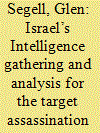| Srl | Item |
| 1 |
ID:
181223


|
|
|
|
|
| Summary/Abstract |
The architects of the Oslo process, at both the academic and intelligence levels, used the faulty ‘New Middle East’ paradigm to posit that the Palestinians were ripe for peacemaking. They ignored the considerable strength of the Islamists who, controlled by the Iranian regime, were deployed as peace spoilers. More than two decades after the collapse of the 2000 Camp David summit, the role of the Iranians has not been fully understood, leading most observers to assume that the Hamas and Palestinian Islamic Jihad are independent actors.
|
|
|
|
|
|
|
|
|
|
|
|
|
|
|
|
| 2 |
ID:
119758


|
|
|
| 3 |
ID:
187760


|
|
|
|
|
| Summary/Abstract |
In this article, I argue that the so-called ‘intifada of knives’ in 2015–2016 was not a new phenomenon in the Palestinian resistance. Instead, it paralleled the situation in Gaza in the mid-1980s when Palestinian Islamic Jihad (PIJ) members engaged in similar attacks. What both periods share is the absence of efficient organisational vehicles facilitating a more durable form of collective resistance. This was the case in the mid-1980s because PIJ was yet to develop the effective organisational structures required to facilitate the resistance its members desired, and this was also the case in 2015–2016 because Palestinian youth are largely disillusioned with Palestinian political factions and traditional party politics as arenas to implement change. As these and similar outbursts of violence offer few, or no, principles for political organising for those who follow, what marked the wave of stabbings in the mid-2010s was not the fury with which they were carried out, but rather the rapidity of their collapse. I thus argue that certain organisational principles are required to sustain and prolong any popular protests for a sufficient period.
|
|
|
|
|
|
|
|
|
|
|
|
|
|
|
|
| 4 |
ID:
184081


|
|
|
|
|
| Summary/Abstract |
On 12 November 2019 Baha Abu al-Ata, a leader of the Palestinian Islamic Jihad in Gaza was targeted assassinated by Israel. Intelligence was the driver of the operation – information and data were the components of intelligence gathering enabling informed decision-making via defence and security analysis. There was effective co-ordination and co-operation between the civilian government, the Israel Defense Force’s Units Skylark, Moran, 504, 8200 and 9900, and the Israel Security Agency. Policy and technicalities were integrated through civil–military relations. The methodology used six sets of different types of intelligence gathering, analysis and risk assessment that were separate yet simultaneously were asking: why, who, when, where, how (what weapon), and assessing repercussions.
|
|
|
|
|
|
|
|
|
|
|
|
|
|
|
|